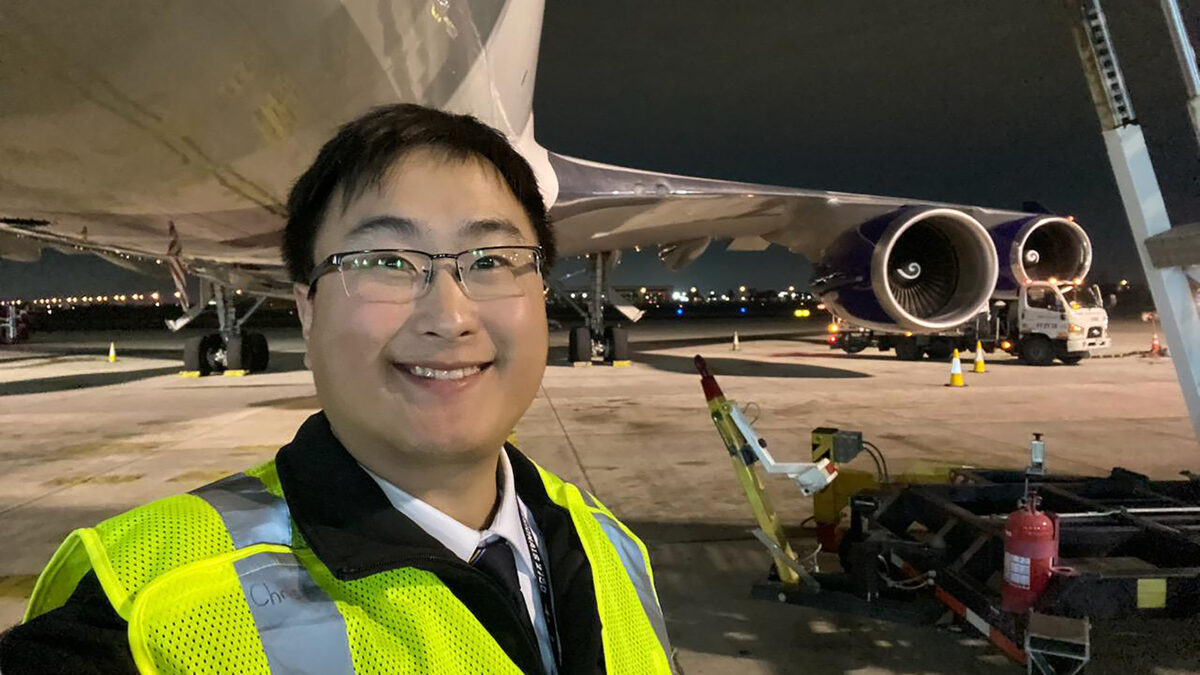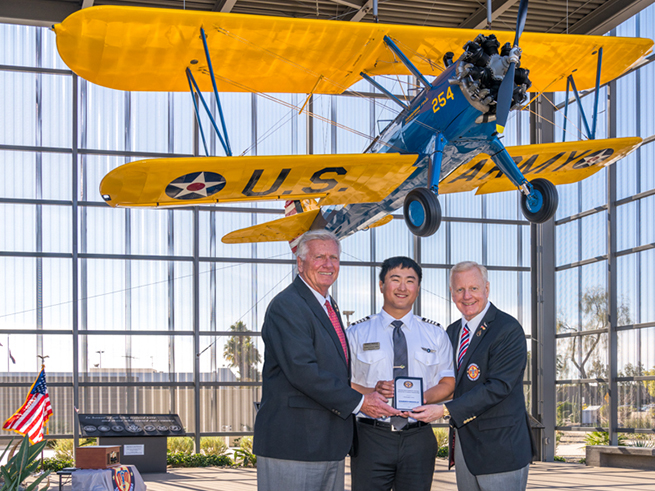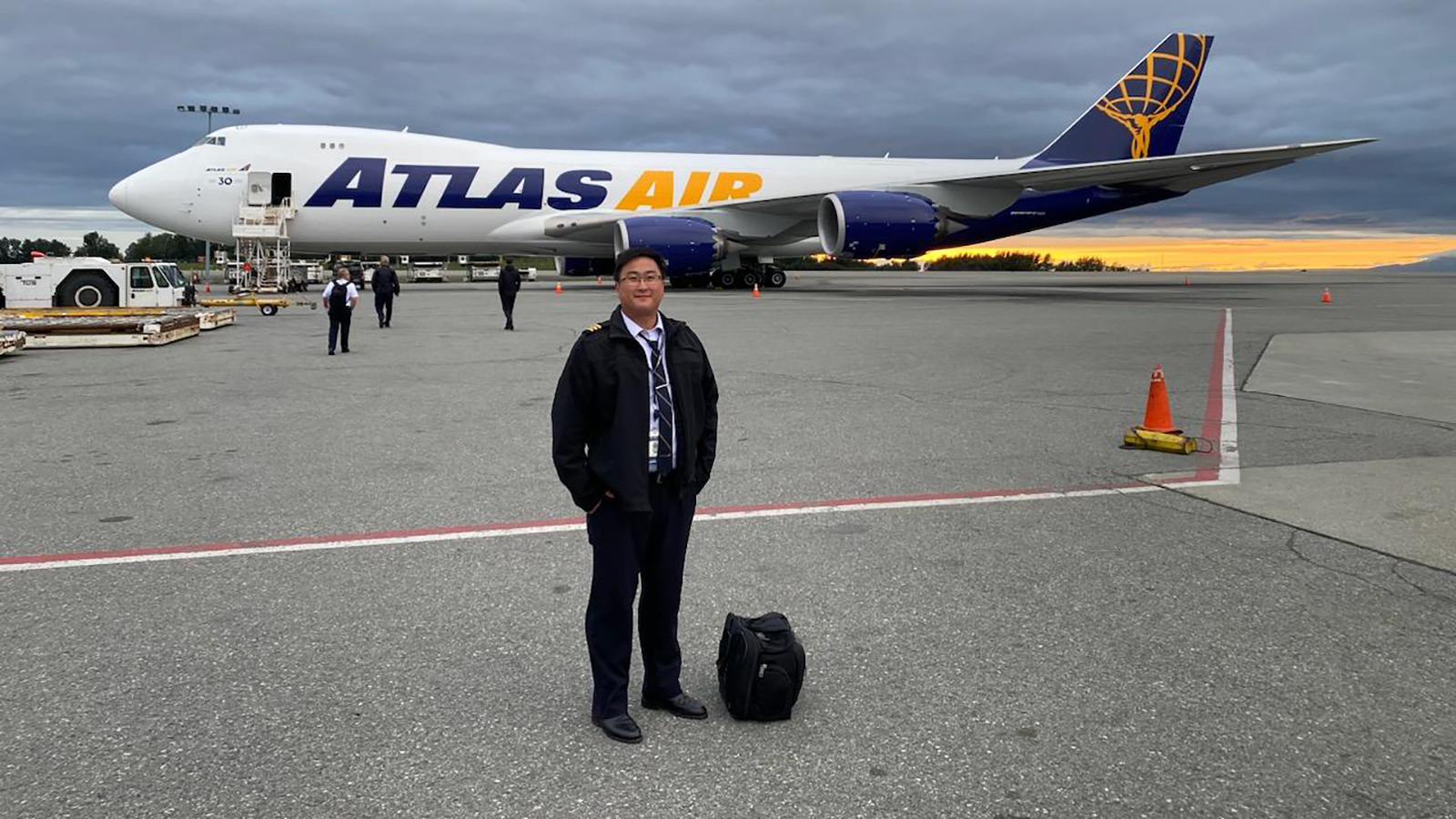The Blue Angels recruited Christopher Awes for Embry-Riddle, at least indirectly. Years later, a Vietnam-era veteran delivered a scholarship and continuing mentorship that helped turn this early dream into a career for the U.S. Marine Corps veteran.
When Awes (’19) watched the Navy and Marine Corps pilots at an air show as a child, he was thrilled. He then got serious about an aviation career in the Marine Corps. His reporting officer was a former F-18 pilot who recommended Embry-Riddle. In the military, he also met an American Airlines pilot, Bob Dunning, who has encouraged him over the years.
Awes earned his bachelor’s in Aeronautics in 2019 on the Prescott Campus. He started in the helicopter program but switched to aeronautics after he earned his helicopter ratings. Recognizing more stable career opportunities, he earned his fixed-wing ratings and became a flight instructor.
“Most rotorcraft jobs are Part 135, so they don’t have the age 65 retirement limit that Part 121 does, and so I felt they’re not feeling the same pressure of a pilot shortage,” Awes says.
He began flying commercially at Mesa Airlines, for their client United Express, but he was eager to fly wide-body aircraft. In 2023, he realized that dream with Atlas Air. You can fit quite a bit on a Boeing 747, so the cargo can be almost anything you can think of. “We fly whatever fits,” he says.
For Awes, his main deck has held a ton of fresh salmon from Santiago en route to Miami and pharmaceutical products from Europe to the U.S. No NFL players, Formula One teams or racehorses yet, but these special charters are a possibility.

Atlas Air received four of the last “Queens of the Skies” produced, and Awes flew one recently. Like many pilots, Awes appreciates the history of the 747, certified in 1969.
“It was one of the first wide-body jets — a jumbo jet and double-decker you could fly across the Pacific without fuel stops. That was a big deal.”
He is also nostalgic about the glamour of bygone air travel.
“I went to the old Pan Am headquarters/training center in Miami when we were using their simulators,” he says. “They display a photo and model of the early plane, equipped with a lounge and bar — quite a different experience for passengers.”
There is no airborne bar these days, but he enjoys flying the 747 today because the size and range of the plane make most of his assignments international. This is a plus for the Minnesota native despite long hours in the air.
“Our flight deck is surprisingly narrow for such a large aircraft, but we have a comfortable place to sleep,” he says. “Trips are completely different from domestic or regional flying. For long-haul international flying, the duty rest limits required by the Federal Aviation Administration give you quite a bit of time at your destinations.”
Awes uses the extra time to explore places such as São Paulo, Incheon and Amsterdam, and he looks forward to visits to Sydney and a return to Japan, where he was stationed as a Marine.
“I used to consider a short flight anything less than an hour and a half, and a longer flight anything greater than three hours,” he says. “Now a short flight for me feels like anything less than eight hours, and the longest blocks are up to nearly 17 hours in the air.”
His military experience left him with an ability to sleep anywhere. He also believes the discipline made him a calmer, more clear-headed pilot.
“When on an overseas deployment, you learn to stay calm and focused,” he says, “which helps you make it through pilot training and be able to make better decisions under pressure.”
A Vet-to-Vet Connection
Rudy R. Miller was an early supporter who remains in Awes’ network. Miller is chairman, president and CEO of The Miller Group, affiliated Arizona-based companies offering venture capital and private equity investing, debt financing, financial advisory and management consulting. Their client base is public and private middle-market companies throughout North America, Europe and Asia.
Miller’s recognition of the value veterans contribute to our country and our skilled workforce is rooted in personal experience. He served in the U.S. Army, U.S. Army Reserve and U.S. Air Force Reserve. His longstanding commitment to advancing the careers of veterans takes the form of scholarships and funding to support simulator training that will enhance pilot safety. Miller also recently joined two influential Embry-Riddle advisory boards for the College of Aviation and the College of Business, Security and Intelligence on the Prescott Campus.

Miller also has an aviation background as investor, advisor and board member of America West Airlines, and he was chairman, CEO and investor for StatesWest Airlines (USAir Express).
Miller met Awes in his role as the chairman of the advisory board and scholarship committee of the Thunderbird Field II Veterans Memorial, Inc. (Tbird2) Aviation Scholarship Program. Their meeting made a lasting impression on Awes.
“I remember flying an Embry-Riddle plane down to Scottsdale for a luncheon and meeting Rudy Miller to thank him for my scholarship,” Awes said. “He shared personal contact information and has stayed in touch as a mentor. I still send him text messages, pictures and updates of my career progress. He thinks it’s fantastic that I’m flying 747s now.”
Miller says has remembers when he met Awes on the tarmac when he landed for the luncheon, along with Steve Ziomek, chairman and president of Tbird2. “In a very short time, Chris and I bonded and began bantering a bit since we are both former staff sergeants,” Miller says. “I am honored to continue to mentor this exceptional individual.”
Miller continued, “Chris’ military achievements, academics, flight aviation training program, awards, and supportive team members at Embry-Riddle all had a major impact in his life and career, as well as his excellent on-the-job skills honed over the past few years with a regional airline.
“He has an outstanding opportunity with Atlas Air, the largest operator of 747 freighter aircraft and one of the industry’s largest cargo fleet. I believe he will continue to excel in his aviation career.”
Awes says that Miller’s encouragement has been an important constant in his life.
“The industry is social, but it can also get isolating and lonely,” Awes says. “You stay busy and you fly with different people, making friends from all over, but you don’t necessarily have constant mentorship, and that makes a difference.”
Awes learned the value of mentorship in the military and he tries to help those entering the industry. He’s an advocate for pilots to work as a flight instructor, which he did at Embry-Riddle.
“I’m constantly talking to my friends who are trying to figure out — Should I teach? Do survey work? Fly for the regionals? I lead them back to instructing. I’m biased, but I believe it is the best way to build time and experience.”
These days, he is always happy to meet a jump-seater from Delta, United or American, often connecting with fellow Eagles. On his first flight for Atlas, his captain was a Daytona Beach graduate, and one of his training captains was Gina Buhl (’90).
“Gina is awesome,” he says. “We did a day of training together for low visibility flying. Working with her professionally is super cool. There is such a connection when you meet another Embry-Riddle graduate. You feel a common ground, and you know where they are coming from and it just makes working together easy.”
Awes is sure to reunite with many more Eagles. He’s in it for the long haul.
